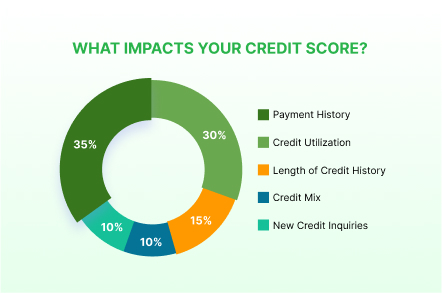
How To Rebuild Credit Score: 8 Credit Repair Tips
Why rebuild credit? How to rebuild credit? What are the best credit repair tips? These are the most asked questions by individuals looking to rebuild credit but are unsure if it's worth it or where to start. In this blog, we answer all of these questions and more.
| Only 1.2% of Americans have a perfect 850 credit score. |
While aiming for a perfect score isn't necessary, having an excellent or at least a good one should surely be a goal. Surprisingly, despite the known advantages of a good credit score and the obvious repercussions of a bad one, approximately 16% of Americans have bad credit, according to Experian data.
This could be due to various reasons, including lack of awareness, financial missteps, or unprecedented circumstances. Nevertheless, you can always rebuild credit. Not overnight, but surely over time. Let's discuss why you should rebuild credit and explore credit repair tips on how to rebuild credit.
Gain Financial Clarity:
Check Your Credit Score Today!
Why Should Rebuilding Credit Score Be On Your Cards?
- Easier Access to Credit: A good credit score is crucial for obtaining credit, such as loans or credit cards, at favorable terms.
- Lower Interest Rates: Since a higher credit score denotes higher financial responsibility, it comes with its perks and privileges. For instance, you may have to pay lower interest rates on loans and credit cards.
- Better Approval Rates: A good credit score gets you in the good books of lenders. This means you're more likely to be approved for credit products, like a credit card or loan. While there are other factors lenders consider, credit scores remain indispensable.
- Improved Housing Opportunities: Not just lenders, but many landlords and property management companies often check credit scores when evaluating rental applications. Moreover, a good credit score can increase your chances of securing the rental property of your choice.
- Better Employment Opportunities: How you handle your finances says a lot about you, and that is why some employers check credit scores as part of the hiring process. Yes, especially if the position involves financial responsibilities. That being said, a higher credit score can improve your chances of being hired. (Given that you're a suitable candidate.)
- Lower Insurance Costs: At times, insurance companies may use credit scores to determine premiums for auto or homeowners insurance. And in such cases, a good credit score can lead to lower insurance costs.
- Utility and Services: In certain situations, utility providers and service companies also check your credit score before providing services. A higher credit score may also make it easier for you to set up utility accounts without requiring a security deposit.
How to Rebuild Credit?
First things first, it is important to determine where you stand on the credit score chart and the reasons behind it to even begin. So, let's start there.
| Credit Score | Creditworthiness | Description |
| 300-597 | Poor | Individuals in this range may face challenges obtaining credit, often leading to higher interest rates if approved. |
| 580-669 | Fair | While considered subprime, individuals in this range may qualify for certain credit, though they may still face higher interest rates. |
| 670-739 | Good | People with scores in this range are generally considered to have good credit, making it easier to qualify for credit with favorable interest rates. |
| 740-799 | Very Good | Individuals in this have a very good credit history, positioning them to receive better-than average interest rates on loans. |
| 800-850 | Excellent | Those with scores in this range boast an excellent credit history, indicating they are very low-risk borrowers, and likely to qualify for the best interest rates and terms. |
What Impacts Your Credit Score?

These factors also impacts credit score
- Public Records and Negative Information
- Credit Report Accuracy
- Financial Responsibility
Now that you know your standpoint and the potential reasons behind it, you're ready to start rebuilding your credit score. However, we know it can be overwhelming. So, we've listed some steps to get you started. And the best part? You can Do It Yourself with an AI-assisted Credit Repair App like CoolCredit. It's easier than you think. However, it is gradual.
How to Rebuild Credit: 8 Credit Repair Tips
1. Review, Identify Inaccuracies and Dispute
Is your Credit Score accurate? This is the first question you need to ask before you start rebuilding your credit. Start by retrieving your credit reports from all three bureaus. Next, review your reports thoroughly for any inaccuracies or errors, these could be:
- Fraudulent Activity
- Account Errors
- Duplicate Accounts
- Incorrect Personal Information
- Late Payments or Missed Payments
- Inaccurate Reporting of Accounts
- Closed Accounts Reported as Open
- Outdated Information
- Inaccurate Public Accounts
- Unauthorized Credit Inquiries
Finally, dispute these inaccuracies as an opportunity to rebuild your credit score. This is the easiest way to fast-track your process to rebuild credit, given that they are legitimate. Moreover, you can do this with the help of a Credit Repair App.
Additionally, reviewing your credit reports regularly will allow you to recognize and address specific areas of concern. Moreover, it’ll give you an insight into how to rebuild credit. And this will enable you to take the necessary steps to rebuild credit right off the bat.
2. Prioritize Timely Payment
Late payments reflect on your credit reports for seven years from the original date.
Yes, and lenders aren't overly fond of a history of late payments. And this is because it demonstrates your sincerity and ability to pay back credit on time. That is also why timely payments remain one of the major determining factors for credit bureaus while calculating scores. So, if you have bad credit and your credit report reflects late or missed payments, it's time to turn things around if you want to rebuild your credit. Make sure timely payments are your utmost priority. Set up autopayments or reminders if it helps. But avoid late payments at all costs if you as much want to rebuild credit.
And remember, it takes time to rebuild credit as it is a gradual process. So, don't lose hope if you make a few timely payments and don't see drastic improvement, it will only happen over time. Nonetheless, paying bills on time remains the most important credit repair tip of all.
3. Maintain Low Credit Utilization
Typically, lenders favor credit utilization below 30% since it shows your ability to manage debt effectively.
Remember, even though you can use all your available credit, you don't have to. In fact, you shouldn't. Especially when you're on an odyssey to rebuild credit. Only use available credit if and when required. Especially beyond a certain ratio. A higher credit utilization shows a high dependence on credit and can lower your credit score by significant points. So, one of the credit repair tips to keep in mind while using your available credit is to keep the ratio as low as possible.
Even if you have to use your available credit, try paying a portion of your balance each week or every few weeks. It increases the chances of your lowest balance being reported to the credit bureaus. Hence, a lower credit utilization may be documented.
4. Get a Secured Credit Card
While it is important to avail credit responsibly and minimally, it is equally important to have a credit history. This is where a secured credit card can be of help. Especially if you're stuck wondering how to rebuild credit or build it from scratch. These cards function similarly to traditional unsecured cards. However, you need to put up a security deposit, usually equivalent to your desired credit limit, to get approved.
Additionally, more often than not, credit card companies hold on to your deposit until you close the account. However, if you exhibit good credit habits over time, some card issuers may refund the amount and turn your account into an unsecured credit account. Availing and paying off credit from these credit cards can help you build or rebuild credit over time.
5. Get a Credit-Builder Loan
Yes, you guessed it right, it's a loan you avail to improve or rebuild credit. These credit-builder loans allow you to take on a small amount of debt and demonstrate that you're a reliable borrower. With the help of these loans, you can establish a history of positive credit behavior by simply making on-time payments. More often than not, you can avail a credit-builder loan at a credit union or community bank. Provided that you're a member or customer and can prove your income and ability to repay. These loans are typically backed by your savings, money market, or CD amount. Here's how it works - the lender holds onto the money as you repay, then releases it once it's repaid. However, some financial institutions may release the funds as and when you lower the balance. The repayments are reported to the credit bureaus and timely repayments can reflect an improvement in your report over time.
6. Negotiate With Creditors for Better Terms
In times of crisis, the wise build bridges. Therefore, during a financial crisis, it is imperative to proactively engage with your creditors, get in their good graces, and try to strike a fair deal. This can significantly aid you in your credit-rebuilding journey. Start by reviewing your outstanding debts and identifying problem areas in your current terms as well as areas for negotiation. After that, contact your creditors to negotiate the terms of the repayment plan, such as lower interest rates, extended payment periods, or reduced monthly payments.
Remember, much relies on negotiation, so approach your creditors with a well-thought-out proposal detailing why revised terms would benefit both parties.
More likely than not, your creditor will understand your circumstances and empathize with you, given you explain yourself well enough. Open communication and a willingness to collaborate towards a mutually beneficial solution are crucial.
7. Save Up Rainy Day Money
Unprecedented expenditures are often the reason for taking on too much credit or being unable to pay back what you owe, resulting in a decline in your credit score. And the best way to evade it is to save up and set aside rainy-day money. But how do you do that in this economy? First, set realistic goals, such as three to six months' worth of living expenses. Second, reduce unnecessary expenses, at least until you've saved up a fair amount of money. Finally, use this rainy-day money only when the skies are grey.
This will not only allow you to rebuild credit over time but also gain financial stability. Moreover, it'll ensure you don't have to take on more credit to cover emergencies in the near future, declining your new inquiries. Implementing this credit repair tip does more than help you rebuild credit in the long run; it allows you to regain control over your finances.
8. Set a Budget and Stick to It
Another tip from the credit repair rulebook to go by is setting a budget and sticking to it. Strictly. And doing it with a lot of intention. It's about more than just penning down your monthly expenses, it's assessing your income, taking all the scenarios and expenditures into account, setting stringent limits, and keeping these in mind throughout the month. Additionally, identify areas where you can cut back and allocate more funds towards debt repayment and savings. This will allow you to repair your repayment history and improve your credit. And increase your savings over time.
Remember, analyze your income, make responsible financial decisions, and most importantly, do not give in to impulse buying. All things considered, setting a budget and going by it will help you be in charge of your money besides repairing your credit score.
How to Rebuild Credit: Additional Credit Repair Tips
- Educate yourself on credit and financial literacy
- Diversify credit types for a balanced profile
- Be mindful of your credit usage and avoid impulse spending
- Learn from past financial missteps
- Become an authorized user on a responsible person's account
- Be patient
Understanding how to rebuild credit is only the beginning, you must act upon the credit repair tips to see real results. More importantly, you must do so with a lot of discipline and patience. Nevertheless, all of this can be overwhelming. But you have nothing to worry about. With a resourceful, AI-assisted Credit Repair App like CoolCredit, you can easily rebuild credit. And the highlight? You can DO IT YOURSELF. Retrieve and review credit reports from all three bureaus, identify inaccuracies and areas for improvement, generate evidence-based dispute letters, and more effortlessly. Learn more about CoolCredit and how it can help you here.
Conclusion
When you choose to rebuild your credit score, you pave the way to greater possibilities and financial stability. Easier access to credit, lower interest rates, improved housing opportunities, you name it. Knowing how to rebuild credit and taking proactive steps to achieve it is primitive. The process is gradual and requires discipline and patience. While it appears to be quite a demanding undertaking, ai credit repair like CoolCredit can help you DO IT YOURSELF easily!
Frequently Asked Questions
Q: How to build credit with a bad score?
A: Building credit with a bad score may be challenging, but it isn't impossible. However, you must take crucial steps and be patient.
- Check your Credit Report
- Pay all your bills on time
- Pay down outstanding credit card balances
- Become an authorized user
- Apply for a secured credit card
- Consider a Credit-builder loan
Q: What is the fastest way to rebuild your credit?
A: There are no shortcuts to a better credit score; take the required steps, and your credit score will improve over time. The quicker and more effective steps you take, the sooner you'll see improvements in your credit.
- Pay your bills timely
- Lower your credit card balance
- Negotiate with Creditors
- Become an authorized user
- Apply for a secured credit card
Q: Can you recover from bad credit?
A: Yes, it's possible to recover from bad credit by taking the necessary steps. However, you should know that it is a gradual process and requires patience and discipline.
Q: How long can it take to rebuild credit?
A: Well, that depends on several factors. It can take as little as a few months to see some improvement, given you take the necessary steps. Nonetheless, it may take a year or more for significant improvements to be reflected in your credit report. You have to be patient and consistent in demonstrating your financial responsibility.
Q: How do I get my credit score up 100 points in one month?
A: Even though there are no shortcuts to increasing your credit score by 100 points in a month, you can follow certain best practices to speed up the process. For one, retrieve and review your credit report using the CoolCredit App, identify errors, and dispute them to the respective bureau. If the error is legitimate, your credit points may increase. However, the time it takes may vary.
Q: How can I build credit using a credit card?
A: Possessing a credit card in itself may not impact your credit. However, choosing a credit card that reports to credit bureaus, making timely repayments in full each month, and maintaining a low credit utilization rate can help you build or rebuild credit over time.





